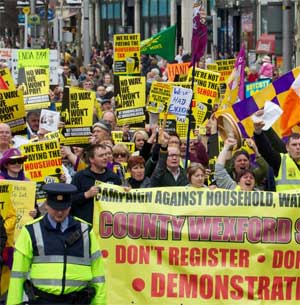Over 30 years of anarchist writing from Ireland listed under hundreds of topics
Ivory tower academics fail to see mass popular organisation against Household Tax
 Dan Hayden and Colin Scott (‘Why People Avoided Paying Household Charge’ 16th April) should get out of their academic ivory tower and talk to some real people if they want to answer the question as to why almost a million households have decided to put themselves in conflict with the government by refusing to register for and pay the household tax. Instead of presenting any real analysis of what is by any stretch of the imagination a massive rejection of government policy they start off by insulting those who decided not to register and go on to present a hotch-potch of half-baked theories which seem designed to do anything other than admit the truth – people made a conscious political decision not to pay.
Dan Hayden and Colin Scott (‘Why People Avoided Paying Household Charge’ 16th April) should get out of their academic ivory tower and talk to some real people if they want to answer the question as to why almost a million households have decided to put themselves in conflict with the government by refusing to register for and pay the household tax. Instead of presenting any real analysis of what is by any stretch of the imagination a massive rejection of government policy they start off by insulting those who decided not to register and go on to present a hotch-potch of half-baked theories which seem designed to do anything other than admit the truth – people made a conscious political decision not to pay.
First the insult. “Even in the worst days of the 1980s,” they claim, “this level of tax avoidance was unthinkable.” As was evidenced from the Beef Tribunal, the tax amnesty of the early 1990s, the Ansbacher scandal and many other examples, tax evasion and avoidance was indeed rife in the 1980s. Not by ordinary workers however who throughout that decade paid inordinately high levels of taxation while many at the top of society adopted a ‘tax is for the little people’ attitude.
30 years later the battle for taxation justice continues. While ordinary workers face, on top of income tax, Universal Social Charge, pension levies, increased levels of VAT etc etc figures from the Revenue Commissioners show that the number of high earners (€100,000+) in Irish society has increased since the onset of the recession while the effective tax rate they pay has fallen.
In addition, Central Bank figures released in May 2011 show that in 2009 the number of people in Ireland with investable assets over $1 million increased by 10% to 18,100. The number of people with investable assets over $30 million increased by 18 to 181. These figures also showed that there is currently about €120 billion held in hard currency and bank deposits in the Irish economy.
So those that have taken a stance on the issue of the household tax have done so not because they want to ‘avoid tax’ but because they are already paying more than their share of tax and because they object to being bled dry in the interest of paying the gambling debts of international financiers while the wealthy get off scot free. But messrs Hayden and Scott prefer to gratuitously insult people by referring to them as tax ‘avoiders’ attempting to associate compliant taxpayers with the tax criminals of Ansbacher and offshore accounts.
Interestingly an extra 3% income tax on all those earning over €100 thousand would bring in €540 million per annum – 3½ times what the household tax would raise if everybody paid it.
But why let facts get in the way of the theory!
And despite all the theorising in the article about ‘why’ people have ‘avoided paying the household tax’ the glaring truth cannot be faced up to. The one thing that I can agree with the authors on is the contention that ‘Everyone knows there is strength in numbers’. And people are organising in huge numbers to resist for exactly that reason.
They have decided not to pay and they have decided to organise with their neighbours, families and workmates to ensure that the government is virtually powerless to impose this tax on a united people.
It’s not because they can’t switch on their computers or don’t know their way to their council offices. People have made a conscious political decision not to pay. In doing so, they have discovered that there is indeed strength in numbers and that as a people we no longer have to accept the government’s and/or international finance’s austerity agenda.
It probably doesn’t fit into the theory but the fact is that people are awakening to their sense of power. It will change the face of how politics in Ireland is done.
This article was origianlly written as a (unpublished) letter in response to an article in the Irish Times by Dan Hayden who is IRCHSS Government of Ireland doctoral scholar in the UCD school of law and Prof Colin Scott who is the director of the UCD centre for regulation and governance

